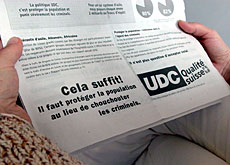Blocher divides Swiss politics

The People’s Party is pushing for its hardline figurehead, Christoph Blocher, to be given a cabinet seat, and is threatening to walk out of government if its demands are not met.
But one of the biggest obstacles to the rightwing party’s cabinet bid is likely to be the controversial figure of Blocher himself.
Whether they find him liberal and intelligent or crude and arrogant, the Swiss rarely seem to sit on the fence when it comes to Blocher.
A member of parliament for almost 25 years, 63-year-old Blocher is used to dividing opinions over issues such as asylum seekers and Swiss membership to the European Union.
His latest bid for a seat in the government looks set to split Switzerland’s political parties in the run-up to December’s cabinet nominations.
“He’s an egomaniac and his party is similarly self-obsessed, and that’s a bad quality in someone looking to join a cooperative [government] body,” Dominik Schaub, the Zurich president of the centre-left Social Democratic Party, told swissinfo.
Personal fortune
As well as heading the party’s Zurich branch, the billionaire industrialist has also poured some of his own personal fortune into political causes close to his heart, such as winning over dissatisfied voters in western Switzerland.
“He’s very intelligent, though he is sometimes very crude,” Fredy Gsteiger, the author of a recent book on Blocher, explained.
“In private he can be a very good debater and listener. But as soon as he’s in the public arena, he goes on the offensive.”
But Aliki Panayides, the People’s Party deputy general secretary, deflects criticism of Blocher’s political style by suggesting that rival parties are simply jealous of his success.
“Of course he likes to provoke, which is very unusual [in Swiss politics],” Panayides told swissinfo. “But it’s very difficult for other parties which don’t have [such figureheads].”
Race issues
International observers are more obsessed with Blocher’s stance on the issue of race and his repeated attacks on those immigrants and asylum seekers who “abuse” the system.
But Clive Church, an expert on Swiss politics at the University of Kent, warns that Blocher should not be compared to the Austrian rightwing hardliner, Jörg Haider.
“It’s not right to start talking about Alpine fascism and equating Blocher with Haider,” Church told swissinfo.
“Although he and his party are anti-European, Blocher basically stands for the defence of the traditional Swiss system.”
Blocher fought against Swiss membership to the European Economic Area and the United Nations, and he is a passionate advocate of Swiss neutrality.
Compromise
The possibility of Blocher becoming cabinet minister has raised questions about his ability to get along with government colleagues from other political parties.
“I think he could become a cabinet minister and he probably could be domesticated,” says Church.
“But even though he says he’s willing to compromise, I would imagine he’d find it very difficult, particularly if he had to deal with the [centre-left] Social Democrats.
“He also probably doesn’t understand exactly what the limits are of being a government minister or a diplomat in the international community.”
But on Sunday, Blocher brushed aside fears about his intransigence: “I’ve been married for 30 years so I know all about making compromises!”
swissinfo, Vanessa Mock
The People’s Party won 55 out of 200 seats in the House of Representatives, making it the largest party.
It has demanded that a second cabinet seat be given to its hardline figurehead, Christoph Blocher, in a move that would change Switzerland’s power-sharing arrangement – the “Magic Formula”.
The People’s Party currently holds one cabinet seat, while the other three main parties each hold two.
Christoph Blocher, the son of a Protestant clergyman, was born in Schaffhausen in 1940.
He owns a 50.1% stake in the chemical group, EMS Chemie.
He became a parliamentarian in 1979.

In compliance with the JTI standards
More: SWI swissinfo.ch certified by the Journalism Trust Initiative



You can find an overview of ongoing debates with our journalists here. Please join us!
If you want to start a conversation about a topic raised in this article or want to report factual errors, email us at english@swissinfo.ch.